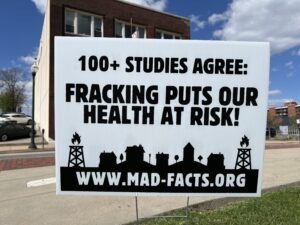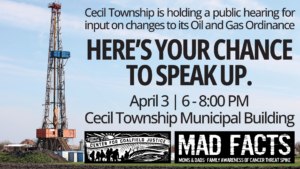Studies and Research
Overviews of the Impacts of Unconventional Oil and Gas Development
Unconventional oil and gas development and health outcomes: A scoping review of the epidemiological research
The review found that 25 of the 29 studies reported at least one statistically significant association between the UOG exposure metric and an adverse health outcome.
Read here
9th Compendium of Scientific, Medical, and Media Findings Demonstrating Risks and Harms of Fracking and Associated Gas and Oil Infrastructure
This is a fully-referenced compilation of evidence outlining the risks and harms of fracking. The public, open-access document is housed on the websites of Concerned Health Professionals of New York and Physicians for Social Responsibility.
Read here
2023 Shale & Public Health Conference
This yearly conference, hosted by the University of Pittsburgh Graduate School of Public Health, features a large variety of experts speaking about topics related to shale gas drilling.
Read here
Studies by Impact
Cancer
PA Health and Environmental Study
Study from the University of Pittsburgh found that children who lived within 1 mile of one or more hydraulically fractured wells had approximately 5 to 7 times the chance of developing lymphoma.
Read here
Unconventional Oil and Gas Development Exposure and Risk of Childhood Acute Lymphoblastic Leukemia: A Case-Control Study in Pennsylvania, 2009-2017
Identified an increased odds of developing acute lymphoblastic leukemia in children with at least one UOGD well within 2 km of their birth residence during the periods of time of 3 months preconception to 1 year prior to diagnosis and 3 months preconception to birth.
Read here
Cardiovascular Disease
Hospitalisations for Cardiovascular and Respiratory Disease Among Older Adults Living Near Unconventional Natural Gas Development: a Difference-in-Differences Analysis
Found PA ZIP codes with UOGD activity that started in 2008-10 were associated with higher hospitalizations for cardiovascular diseases in older adults in 2012-15.
Read here
Acute Myocardial Infarction Associated with Unconventional Natural Gas Development: A Natural Experiment
Found that 100 cumulative wells drilled in a county were associated with a 1.4-2.8% increase in acute myocardial infarction (AMI) hospitalizations and a 5.4% increase in AMI mortality in middle-aged men.
Read here
Unconventional Natural Gas Development and Hospitalization for Heart Failure in Pennsylvania
Identified increased odds of hospitalization among individuals with heart failure across multiple UOGD phases and levels of UOGD activity. Associations were higher in individuals with more severe heart disease.
Read here
Respiratory Disease
Unconventional natural gas development and pediatric asthma hospitalizations in Pennsylvania
Found that community-level UOGD activity was associated increased odds of pediatric asthma hospitalizations.
Read here
Association Between Unconventional Natural Gas Development in the Marcellus Shale and Asthma Exacerbations
Found that residential UOGD activity was associated with an increased risk of mild, moderate, and severe asthma exacerbations.
Read here
Birth Outcomes
Hydraulic fracturing and infant health: New evidence from Pennsylvania
Found an increased probability of having a child with low birth weight with a maternal residence of within 3 kilometers of fracking sites, with the largest impact within 1 kilometer.
Read here
There’s a World Going on Underground—Infant Mortality and Fracking in Pennsylvania
Identified an increase in early infant deaths in ten heavily fracked counties following fracking initiation (2007-2010) compared to a control period of 2003-2006. Unconventional natural gas development and birth outcomes in Pennsylvania, USA
Read here
Unconventional natural gas development and birth outcomes in Pennsylvania, USA
Found an association between unconventional natural gas development activity and preterm birth (OR = 1.4, 95% CI 1.0-1.9). In a post-hoc analysis, also found an association with physician-recorded high-risk pregnancy (OR = 1.3, 95% CI 1.1-1.7).
Read here
PA Health and Environment Study
A 2023 study by the University of Pittsburgh found an increased, but not significant, risk of small for gestational age and decreased birth weight.
Read here
Mental Health
The Association of Unconventional Natural Gas Development with Diagnosis and Treatment of Internalizing Disorders Among Adolescents in Pennsylvania using Electronic Health Records
Identified increased odds of new onset internalizing disorders in females in areas with higher UOGD activity during years with highest UOGD activity (2010-2016).
Read here
Exposure Assessment of Adults Living Near Unconventional Oil and Natural Gas Development and Reported Health Symptoms in Southwest Pennsylvania, USA
Reviewed a survey containing self-reported symptoms and found itching or burning eyes, stress, dry skin, difficulty sleeping, and lightheadedness/dizziness to be statistically significantly associated to the cumulative wellsite density within 5 km of respondents’ homes.
Read here
Health Conditions in Retired Manual Labor Miners and Oil and Gas Extraction Workers: National Health Interview Survey, 2007–2017
Found that retired oil and gas workers experienced a significantly higher prevalence of both hearing loss and self-reported poor health status than all other retirees.
Read here
Particulate Matter and Mental Health The study found that higher PM2.5 exposure was strongly associated with higher risk of depression and anxiety. Read more here
Occupational Health
Suicide Rates by Industry and Occupation — National Violent Death Reporting System, 32 States, 2016
In 2016, the CDC analyzed violent death data among 20 major industry groups and found men working in the "Mining, Quarrying, and Oil and Gas Extraction" field had the highest suicide rates.
Read here
Water Impacts
Radium in our water from fracking: Radioactivity from oil and gas produced water accumulated in freshwater mussels
Read here
Drinking Water, Fracking, and Infant Health
Found consistent and robust evidence that drilling shale gas wells negatively impacts both drinking water quality and infant health.
Read here
EPA's Study of Hydraulic Fracturing and Its Potential Impact on Drinking Water Resources
EPA found scientific evidence that hydraulic fracturing activities can impact drinking water resources under some circumstances.
Read here
Air Quality
Air Pollution and Health Impacts of Oil & Gas Production in the United States
This article highlights the substantial air quality and health impacts of oil and gas production in the US in 2016, including significant contributions to asthma exacerbations, childhood asthma cases, and premature deaths, totaling $77 billion in health impacts.
Read here
Air Quality Impacts of Shale Gas Development in Pennsylvania
Utilizing a high frequency, high resolution satellite-based measure of PM pollution between 2000 and 2018, we identify causal increases in PM2.5 concentration ranging from 0.017 μg/m3 to 0.062 μg/m3 in the vicinity of over 20,000 wells, resulting in approximately 20 additional deaths between 2010 and 2017.
Read here
Public Health News
Here are the latest articles written by the Center for Coalfield Justice team on the subject of public health. We regularly publish new information so check back often for new articles.
Tonya and Jodi Reflect on the Health Effects Institute Conference in Philadelphia
The Health Effects Institute is a nonprofit corporation that provides impartial and relevant science on the health effects of air pollution. The Philly Conference covered several topics that were of […]
Want a MAD-FACTS yard sign? Let us know by signing up! We will deliver!
Fracking puts our Health at Risk- and we need your help to get the word out across the community! We are so excited to announce that we have MAD-FACTS yard […]
Cecil Township to Amend Oil and Gas Ordinance on April 3rd
On Monday March 4th, CCJ Organizer Jodi Borello and Organizing Director Heaven Sensky attended a Cecil Township Supervisors Meeting alongside Janice Blanock, a CCJ member and co-organizer of the group […]



